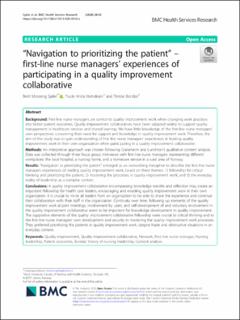| dc.contributor.author | Sjølie, Berit Harriet Mosseng | |
| dc.contributor.author | Hartviksen, Trude Anita | |
| dc.contributor.author | Bondas, Terese Elisabet | |
| dc.date.accessioned | 2020-07-07T12:40:37Z | |
| dc.date.available | 2020-07-07T12:40:37Z | |
| dc.date.created | 2020-03-02T06:43:06Z | |
| dc.date.issued | 2020 | |
| dc.identifier.citation | Sjølie, B. H. M., Hartviksen, T. A. & Bondas, T. E. (2020). “Navigation to prioritizing the patient” – first-line nurse managers’ experiences of participating in a quality improvement collaborative. BMC Health Services Research, 20: 55. doi: | en_US |
| dc.identifier.issn | 1472-6963 | |
| dc.identifier.uri | https://hdl.handle.net/11250/2660986 | |
| dc.description.abstract | Background
First-line nurse managers are central to quality improvement work when changing work practices into better patient outcomes. Quality improvement collaboratives have been adopted widely to support quality management in healthcare services and shared learning. We have little knowledge of the first-line nurse managers’ own perspectives concerning their need for support and knowledge in quality improvement work. Therefore, the aim of this study was to gain understanding of first line nurse managers’ experiences in leading quality improvement work in their own organization when participating in a quality improvement collaborative.
Methods
An interpretive approach was chosen following Graneheim and Lundman’s qualitative content analysis. Data was collected through three focus group interviews with first-line nurse managers representing different workplaces: the local hospital, a nursing home, and a homecare service in a rural area of Norway.
Results
“Navigation to prioritizing the patient” emerged as an overarching metaphor to describe the first-line nurse managers experiences of leading quality improvement work, based on three themes: 1) fellowship for critical thinking and prioritizing the patient; 2) mastering the processes in quality improvement work; and 3) the everyday reality of leadership as a complex context.
Conclusions
A quality improvement collaborative encompassing knowledge transfer and reflection may create an important fellowship for health care leaders, encouraging and enabling quality improvement work in their own organization. It is crucial to invite all leaders from an organization to be able to share the experience and continue their collaboration with their staff in the organization. Continuity over time, following up elements of the quality improvement work at joint meetings, involvement by users, and self-development of and voluntary involvement in the quality improvement collaborative seem to be important for knowledge development in quality improvement. The supportive elements of the quality improvement collaborative fellowship were crucial to critical thinking and to the first-line nurse managers’ own development and security in mastering the quality improvement work processes. They preferred prioritizing the patients in quality improvement work, despite haste and obstructive situations in an everyday context. | en_US |
| dc.language.iso | eng | en_US |
| dc.publisher | Springer Nature | en_US |
| dc.rights | Navngivelse 4.0 Internasjonal | * |
| dc.rights.uri | http://creativecommons.org/licenses/by/4.0/deed.no | * |
| dc.title | “Navigation to prioritizing the patient” – first-line nurse managers’ experiences of participating in a quality improvement collaborative | en_US |
| dc.type | Peer reviewed | en_US |
| dc.type | Journal article | en_US |
| dc.description.version | publishedVersion | en_US |
| dc.rights.holder | © 2020 The Author(s) | en_US |
| dc.subject.nsi | VDP::Medisinske Fag: 700::Helsefag: 800 | en_US |
| dc.source.pagenumber | 13 | en_US |
| dc.source.volume | 20 | en_US |
| dc.source.journal | BMC Health Services Research | en_US |
| dc.source.issue | 55 | en_US |
| dc.identifier.doi | 10.1186/s12913-020-4918-z | |
| dc.identifier.cristin | 1798792 | |

